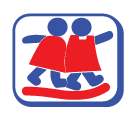The Well-Rounded Three-Year-Old: How Preschool Plants the Seeds for Success, Part II
Part II: Social Development
When the Wall Street Journal recapped a study that noted differences between children attending preschool and those who did not, one surprising outcome was that preschoolers showed a five-month lead in executive function skills such as listening, planning, and self-control by the time they reached pre-K ages. While preschool offers three-year-olds tremendous cognitive growth and prepares them for elementary school, its social benefits are really important, too! This is the time when children learn about themselves and others; they’re becoming less self-centered, less dependent on parents and caregivers, and more secure in playing, exploring, and connecting. Plus, as they start to develop their earliest friendships, they also learn what’s likeable and unique about themselves, which builds self-esteem.
Learning How to “Be” at Preschool
In this four-part series, we’re looking at how preschool programs plant the seeds for long-term success in various areas, and why every child should be given a chance to grow further with a strong socio-educational foundation.
In Part 2, we’re considering social development. There’s a belief that we learn who we are by being mirrored back by others…and three-year-olds are at that tender, exciting place of figuring out who they are around their peers, apart from parents and caregivers. This is a time of tremendous social growth that will prepare them for the years ahead.
The Top 5 Social Benefits
Early childhood education settings offer preschoolers the opportunity to interact with other children, teachers, aides, and other parents, building social skills to last a lifetime. Interaction with non-family members is invaluable because it’s very difficult to replicate at home. As young children learn about themselves and others, the social lessons increase, including:
- Moving from me to we: Toddlers can be a somewhat self-focused bunch but, by the time they turn three, these newly-minted preschoolers become more aware of others—talking, listening, sharing, and practicing manners.Preschools create a place for these skills to be honed.
- Accepting differences: Children are curious—and sometimes blunt!—about anyone different from them. But the best preschools are filled with children from diverse backgrounds, races, physical abilities, and economic statuses—all of which teach children empathy and tolerance.
- Caring about others: As children develop more compassion, it’s not unusual to see them offering a hug, a helping hand or a huge smile to their classmates…and this “other-awareness” will serve them well across their relationships.
- Getting serious about make-believe: Three-year-olds are remarkably creative and spend a lot of time inventing imaginary worlds for themselves and their playmates. This type of play is critical to social development in terms of collaboration, communication, and if/then sequencing, but also boosts cognitive/executive function skills like problem-solving.
- Developing self-control: With growing independence comes personal responsibility; preschool gently teaches and reinforces this lesson. Here, three-year-olds learn about taking turns, expressing feelings in a healthy way, following directions and generally becoming more responsible for themselves.
Interested in learning more about the benefits of preschool? Check out Part 1 of The Well-Rounded Three-Year-Old: How Preschool Plants the Seeds for Success for the top five cognitive benefits of getting your preschooler involved with early education.


